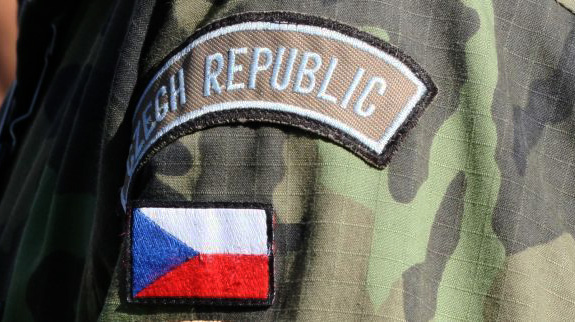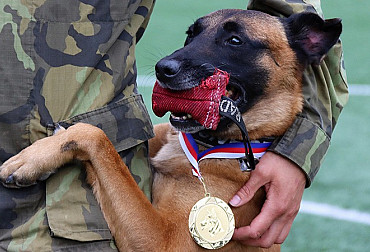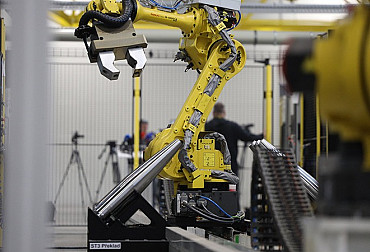Czech soldiers will not go to Poland to help yet
Yesterday, Defence Minister Lubomír Metnar decided, after a meeting with his Polish counterpart Mariusz Blaszczak, to suspend the process of approving the mandate for sending a unit of Czech Army soldiers to help on the Polish-Belarusian border, which was to be submitted for discussion and approval by both chambers of the Czech Parliament. According to the Polish Defence Minister, there is no need to send Czech soldiers to Poland yet. The Government approved the proposal to send 150 soldiers at its meeting on 8 December. Under the original agreement, the 150 soldiers were to come from the 15th Engineer Regiment, 53rd Reconnaissance and Electronic Warfare Regiment, 102nd Reconnaissance Battalion and 533rd Unmanned Systems Battalion, with a mandate to serve until 31 July 2022.
"The planned deployment of Czech troops to Poland is not necessary for the time being, as the situation on the border with Belarus has managed to stabilise. In this spirit, I was informed by Polish Defence Minister Mariusz Blaszczak both by an official letter and in a personal telephone meeting," Defence Minister Lubomír Metnar summarised the current developments. The resolution of the Committee on Defence from Monday morning (Parliamentary Print 74/1) is already in the Chamber of Deputies, in which the Ministry of Defence agreed to the deployment of forces and means of the Ministry of Defence in the Republic of Poland to strengthen the protection of the Polish-Belarusian border, in the number of up to 150 people for a period of up to 180 days in the period from the date of approval by the Parliament of the Czech Republic until 31 July 2022. According to a press release issued yesterday by the Ministry of Defence, the actuality of the deployment of members of the Czech Army would depend on a renewed deterioration of the current situation.

Picture: Czech soldiers will not go to Poland to help for the time being. (illustration photo) | Ministry of Defence of the Czech Republic
It appears that the situation on the Polish-Belarusian border is of wider significance. That is to say, not only in terms of dealing with the migration crisis on the ground, but also in the context of the overall security situation on the European Union's external border. In addition to this, tensions are escalating on the eastern border of Ukraine, where Russian and Ukrainian troops are massing. In this context, over the weekend (when the suspension of the deployment of Czech troops to Poland was not yet officially known), we put the following three questions to the senators from the Committee on Foreign Affairs, Defence and Security and the MEPs from the Committee on Defence:
1. Do you agree with sending our troops to the Polish-Belarusian border?
2. Should our Army make a greater contribution to the protection of the EU's external border?
3. In your opinion, is sending our Army to Poland a message not only to Belarus, but also to Russia?
Here are the answers of the MPs and Senators who responded
Pavel Fischer, Senator, Chairman of the Committee on Foreign Affairs, Defence and Security
1. Poland is our ally and has a large military presence on our eastern border. They have asked us for help and there is nothing to wait for. Some details of the mandate needed to be clarified, and we did that in the Senate committee on 7 December, before the Government had time to decide on the deployment. We will not delay the debate in the Senate. I expect that we will discuss the Government's proposal at the extraordinary session so that we can submit it to the Senate plenary for approval on 15 December.
2. What is happening on the borders of Belarus is a hybrid war that also concerns us. We are on the verge of open conflict. The Belarusian army is reaching out to abuse the migrants that Belarus has invited and brought to the border in an organised manner. And where there is warfare, there is a need for defence. So yes, defence cannot be provided without the military.
3. The crisis in Belarus is linked to Russia's activities. The two countries are linked by a defence pact, their armies cooperate. If there is a message here from the Czech Republic, it is simple: we will not allow democracies in EU and NATO countries to be destabilised just because the Lukashenko regime is at the end of its tether and has decided to retaliate for sanctions from Brussels. The North Atlantic Alliance has a reinforced presence on the eastern flank. Our troops are already operating in Latvia and Lithuania and in Poland. In that sense, this is nothing new. What has changed is the growth of tensions that need to be resolved diplomatically. At the same time, however, we must secure the defence of our countries.
Pavel Růžička, MP (ANO), Vice-Chairman of the Defence Committee
1. Yes, I agree, neighbouring countries must help each other, and the fight against migration was on our election programme, even though some media outlets, such as the Czech Republic, constantly questioned it.
2. It depends on whether the states that are fighting migration are interested in our deployment at all. Poland has made it quite clear that they are interested in our help.
3. Above all, it is a message to our citizens that we are not interested in uncontrolled economic migration, whoever is behind it.
Josef Flek, MP (STAN), Vice-Chairman of the Committee on Defence
1. I agree. The situation on the border there is tragic. The incoming Government continues to advocate cooperation within the V4. Poland is part of this group, it is our neighbour and ally, and we should show solidarity. In the end, it will not only be about Poland, it will be about us. The practices of the Belarusian regime, which uses human beings as human shields, are disgusting. Tens of thousands of people are involved.
2. Yes. Within the EU area, we have two concepts - one is the free movement of people within the Schengen area, and the other concerns external border protection. I am of the opinion that, if we want to have a viable Schengen area in which we can move across countries without fear, we must have the external border of the EU protected all the more. There are various means, such as strengthening the powers of Frontex, involving the armies of the Member States, etc.
3. For the regimes in Russia and Belarus, the EU is a great target for bullying. Their aim is to destabilise the region. We must show that these times are over. Constructive cooperation can only be done with those who are interested in it. However, Belarus and its patron, Russia, only understand power.
Jan Hoffman, MEP (ODS), Vice-Chairman of the Committee on Defence
1. I agree with sending our Army to Poland. The situation on the Polish-Belarusian border is not simple and the Czech Republic must support its partners. The soldiers will be carrying out monitoring and engineering and construction operations, and there should be no direct contact with migrants.
2. I do not think it is necessary to involve our Army in the protection of EU borders more than at the request of individual EU states.
3. There is a certain message for Russia. Troops from other EU countries are also heading to Poland, which sends a clear signal of intolerance of the use of hybrid actions organised against EU countries and of a unified action against them. It is also a positive signal for Poland and our relations with each other.
Ladislav Faktor, Senator, Member of the Committee on Foreign Affairs, Defence and Security
1. Yes, I will vote in favour of sending our engineers to Poland.
2. For the time being, we have had a rather bad experience with the protection of the European Union's external border. In my opinion, Poland has done the right thing and made a flexible decision. The same cannot be said of other EU members. Sending our army abroad is, of course, an exceptional measure, and I would remind you that such use of the army is a political decision of both Houses of Parliament.
3. In my opinion, the Czech Republic, as a member of the Alliance, should fulfil its allied commitments accordingly. It is true that we are currently in very turbulent times, full of strong political statements from both sides. Not only Belarus, but especially Ukraine, as Russia's neighbour, is under immediate threat from the concentration of Russian troops on its border. However, all diplomatic means have far from been exhausted. Strong messages are currently flying from one side to the other; it is a war of nerves, I hope.
Radovan Vích, MP (SPD), member of the Defence Committee
1. Yes, I agree. It is necessary to combat migration and, moreover, this is a failure of the EU, which, on the one hand, is helping illegal migrants to reach Europe via its Frontex agency via the Mediterranean, but, on the other hand, has no capacity to help stop illegal migration on the Polish-Belarusian border. Moreover, this is an offer by President Zeman, which the Polish side has accepted and has agreed to send our forces and resources to the Czech Armed Forces. Poland is our neighbouring state, with which we are also in a joint V4 formation, and this assistance is in the interests of protecting the security of our citizens.
2. No. It is necessary to protect the borders of our country first and foremost, because "Schengen" is as leaky as a colander and does not work.
3. It is a message to Poland in particular that we are a strong partner within the V4 and if there is a need and a demand from their side when the EU is failing, we can be counted on.
Jiří Horák, MP (KDU-ČSL), member of the Defence Committee
1. Of course, if our partners from Poland or Lithuania express an interest in supporting them with the presence of our troops on the EU's external borders, we should do so unequivocally.
2. I think that the protection of the EU's external borders is one of our foreign policy priorities, so we should be prepared to defend them, and the deployment of our troops is logically linked to that.
3. On the relationship with Russia, it is important that we send a clear signal of unity with our partners in NATO and in the EU. Russia must be absolutely clear that any form of aggression on its part against members of the North Atlantic Treaty Organisation, the EU or other sovereign states such as Ukraine will not be tolerated. I would, of course, like to see relations with Russia normalised, but it is impossible to ignore its activities, which clearly threaten security and stability in Eastern Europe.
Marek Ostradal, Senator (STAN), member of the Committee on Foreign Affairs, Defence and Security
1. Definitely yes. I am the mayor of the municipality of Náklo and we have a twinning with Náklo nad Notecia, which is in Poland. I often go there and we have a long-standing friendship with our Polish colleagues. I know from our discussions together how concerned they are about the issue of Russia and Belarus, and that all these events are experienced very intensely throughout Poland. But Jarek Nohavica once said somewhere that the Poles like us better than we like them. I have to give him credit for that, because we often criticise them, and sometimes we even blame them, while we could learn a great deal from them. They are our neighbours and I think that they would not hesitate for a moment otherwise. They need to feel the support of their neighbours and friendly countries; it will strengthen their self-confidence, which is very important in such situations. After all, we have been taught from a young age that friends should help each other.
2. If we pretend that the problems at the EU's external borders do not concern us, the time will come when we will pay the price. The world has become much smaller in recent years due to new technologies. What once seemed far away is now at our doorstep and entering our homes. Recent events are a great example. A new mutation of a virus appears somewhere on the other side of the world, and within a few weeks and sometimes days it is here in our country, despite all security measures. So what are we waiting for? What is really us these days? Us as us, or us as our families, villages, regions, or us as Czechs and Moravians, us as Europeans, or us as humanity? Let us not be short-sighted, in today's world there is no hiding anymore.
3. Much has happened in relations with Russia in recent years. Vrbětice, Dukovany, diplomatic rifts, and the list could go on and on. Since the Velvet Revolution, the Czechs have freed themselves from ties to their former saviour and are acutely aware of what is right and what is wrong. Russia is unable to accept that it is starting to miss the train in the new world and is trying to increase its influence by force. Any defiance is then perceived very negatively and creates further scars on a bruised ego. Belarus and Russia have come together because their attitudes are similar in many ways. But in the new world they already look outdated and stupid. It is like some people, they become self-centered, relational, nervous and bitter. Then it doesn't matter what you say or do, they see an attack behind everything and see everyone as an enemy.
Even though we may then see the sending of our troops to Poland as the correct and supposed support of our neighbours and friends in the conflict caused by Belarus, Russia will always see it as an attack on its interests.
Václav Láska, Senator (SEN 21), member of the Committee on Foreign Affairs, Defence and Security (sent his opinion, which he published on social media)
The Czech government has approved the deployment of Czech soldiers on the border between Poland and Belarus. The deployment must be approved by the Parliament. For the first time in my seven years in the Senate, I have doubts about how to vote on the deployment. So far, I have supported all the deployments of Czech soldiers on foreign missions.
What is happening on the Belarusian-Polish border? Our Polish friends are in a difficult situation under pressure from a Belarusian (and probably Russian) dictator who is forcibly pushing refugees onto the common border. He has had them smuggled in under the false promise that they are assured free passage to Germany. Many have paid for that promise and the journey with all their family savings. And now they're freezing at the border. With the Polish border in front of them and armed Belarusian soldiers behind them. Often they can't even get there or back and are in real danger of simply freezing to death.
Czech soldiers are to go to Poland to help protect the border. While their mandate is certainly not to intervene directly against refugees in any way, the result of their mission (if 'successful') may realistically result in people dying on the other side of the border, including women and children. This is what discourages me from raising my hand to send our troops.
On the contrary, the fact that Poland is under pressure from the hybrid threat speaks in favour of sending them. The movement of migrants is a controlled action by the Belarusian and probably also Russian military forces. Refugees may be attacking the Polish border, but they are in an intractable situation, which the Belarusian dictator has put them in. Every stone thrown by them is a stone thrown by the Lukashenko regime. Russia and Belarus are attacking Poland and testing European unity. And every European soldier sent to defend the Belarus-Poland border (Estonian and British soldiers are already there) is a declaration of European unity that can deter Lukashenko and Putin from more serious aggressions. And at a time when tens of thousands of Russian troops are camped on Russia's border with Ukraine, such a demonstration of European unity is needed.
I also see a small positive aspect of the Czech mission in the fact that it may help the objectively overstretched Polish soldiers, who will then hopefully be able to deal with the escalated situation on their borders more calmly and without any shortcuts or excesses.





















